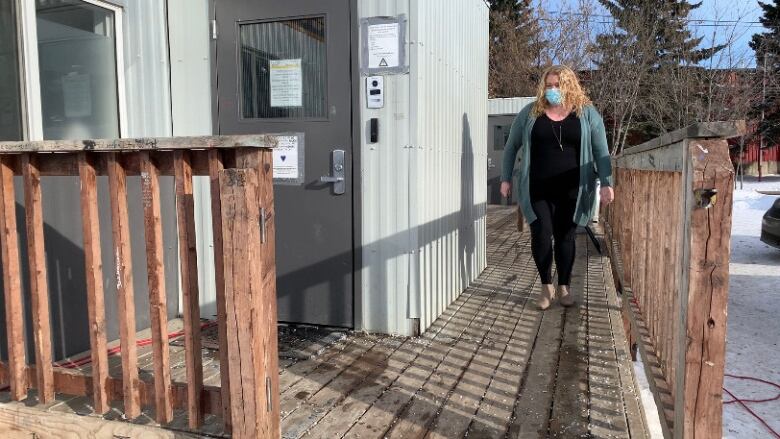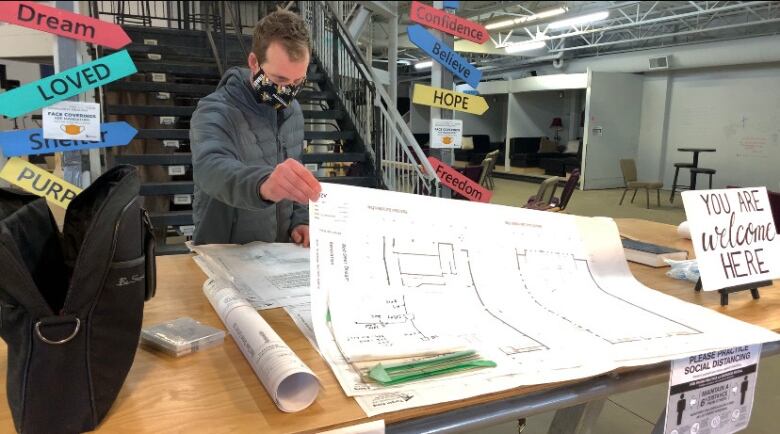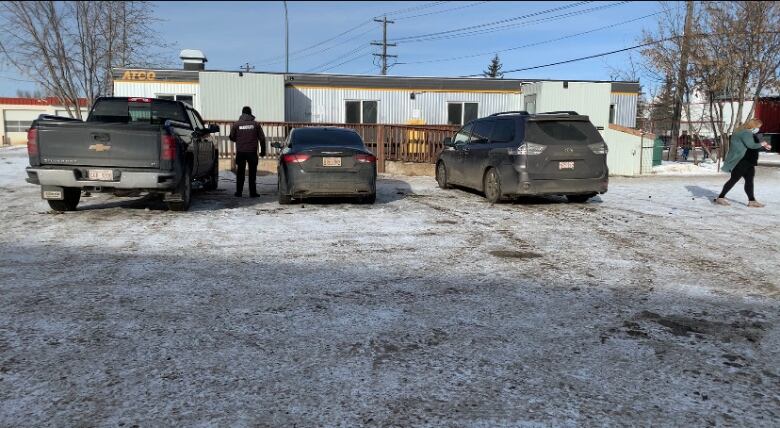Advocates call for a permanent solution to Red Deer's overdose problem
Construction set to begin next month on 40-bed residential treatment centre

CBC Edmonton and CBC Calgary have teamed up to launch a pop-up Red Deer bureau to help us tell your stories from central Alberta. For the next month, reporter Heather Marcoux will bring you the news from Red Deer and the surrounding area. Story ideas and tips can be sent toheather.marcoux@cbc.ca.
The overdose prevention trailer in downtown Red Deer was supposed to be temporary when it arrived in 2018, buttwo years later it's still saving lives in the Safe Harbour parking lot.
Last week,there were 38 overdoses in the trailer where someone neededoxygen or naloxone or both to be revived.
"We had a 24-hour period last month where we had 13 overdoses recorded," said Sara Fleck, clinical manager of the Turning Point Society of Central Alberta, which runs the trailer.
"We can never predict what is going to come into our site. So we'll have some weeks where we don't have any overdoses. And then overnight there will be a new substance in town that is identified by our clients as being stronger, and we'll see several overdoses."
From January to November 2020, the rate of drug poisoning deaths in Red Deer per 100,000 persons per year was 50.3, provincial statistics show.Edmonton's rate was 40.3 andCalgary's was 31. In Red Deer, 44 of the 51 drug deaths recorded in the first 11 months of 2020 were caused by opioids.
The community hasn't seen numbers this high since 2018, when Red Deer's rate per 100,000 climbed to 50 at a time when Edmonton's rate was just 21 and Calgary's was 24.5. That year,former health minister Sarah Hoffman called Red Deer's drug crisis an emergency and authorized the temporary trailer.
Fleck said Red Deer needs a permanent supervised consumption site.
"In this overdose prevention site, our mandate is to save lives," she said. "And we provide referrals to health and social services, and really act as an entry to the health services for people. But at a supervised consumption site, we were going to have addictions and mental health support on site, and a very wide variety of wrap-around services."

Fleck wants to provide more support so Turning Point can better help people rebuild their lives. She said Red Deer's high overdose ratealso reflects the community's lack of access to local treatment centres.
A group of Christian business people are trying to remedy that by creating a rehab facility in downtown Red Deer.
Next door to a strip club and across the street from the police station sits the building formerly known as the Lotus Nightclub, which is being transformedinto a residential treatment facility called the Dream Centre.
Local real estate agentWes Giesbrecht, president of the Red Deer Dream Centre, said he believes in the power of community and recovery.
The Red Deer Dream Centre is modelled after similar facilities in Los Angeles and Calgary. Giesbrecht saidthe group has raised more than half of the $1.4 million in capital costs through private donations from the community, and he expects construction on the new 40-bed treatment facility for men to begin next month.
"So far, we're seeing our numbers coming in a little bit under budget, we're hoping to be we're praying that we're going to be under budget. We've raised just under $800,000, privately at this point in time, with no government subsidies or funding."

Giesbrechtsaid the centre has applied for government grants at the federal, provincial and municipal levels but plans to be sustainable without that funding, through support from Red Deer's faith community.
"I think it's time that we stop looking to the government for solutions," he said. "I think as a community, the faith community in particular, we believe in recovery."
The Dream Centre is still looking to fundraise about $600,000 before June and expects to be housing men by the end of the year.
He hopes that in five years people can look at Red Deer and see a community with low rates of drug use and overdoses.
"It is not enough to just give somebody clean needles anymore,"said Giesbrecht. "It's not enough just to get them detoxed. You need to give them tools to teach them how to live without this stuff."
At the ATCO trailer behind Safe Harbour, Fleck also wants to see a different Red Deer in five years, one with more permanent supports than the trailer can provide.












_(720p).jpg)


 OFFICIAL HD MUSIC VIDEO.jpg)
.jpg)



























































































